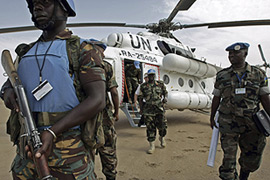US envoy for easing Sudan sanctions
Scott Gration seeks Khartoum’s removal from US list of “state sponsor of terrorism”.

“Sudan has appreciated the positive signals,” Abdul-Mahmoud Abdul-Halim, Sudan’s ambassador to the UN, was quoted as saying by the state SUNA news agency.
He called for a new relationship between Khartoum and Washington “based on respect of Sudan’s choices” and in “the interest of the two nations”.
Sudan was designated as a state sponsor of terrorism in 1993, but in its latest report, the US state department described Sudan as “a co-operative partner in global counterterrorism efforts”.
North-South peace
The administration of Barack Obama, the US president, has given Gration the task of helping to maintain a Sudanese peace deal signed in 2005, which ended two decades of civil war in the African nation.
| in depth | |||||||||||||
|
Under the agreement a coalition government was established in Khartoum which included former rebels from the south of the country.
In 18 months the south will vote in a referendum on whether to remain in a united Sudan or split and form a separate nation.
Gration said that the sanctions needed to be eased “so that we can do the very things that we need to do to ensure a peaceful transition and a state that’s viable in the [south] should they choose to do that”.
He noted that the restrictions prevented heavy equipment being brought into the country to build roads and railways that are vital to improve the country’s infrastructure.
George Bush, Obama’s predecessor, increased the sanctions on Sudan in 2007, barring 30 companies controlled by the Khartoum government from using the US banking system or doing business with US companies as well as other measures.
Darfur ‘getting better’
A continuing conflict in western Darfur was cited as the reason for the greater restrictions, but Gration told the senate committee that the situation in the region was “getting significantly better”.
“There’s significant difference between what happened in 2004 and 2003, which we characterised as a genocide, and what is happening today,” he said.
 |
| The United Nations has extended the mandate of its peacekeeping force in Darfur [Reuters] |
However, at a meeting to extend the mandate of the UN peacekeeping force in Darfur, Security Council members expressed concerns about the ongoing violence and the pace of peace talks.
“There is still serious concern … about the security situation on the ground and the rather slow progress in the political track,” John Sawers, Britain’s ambassador to the UN, said.
Predominantly non-Arab rebels in Darfur rose up against the Sudanese government and allied militias in 2003, accusing Khartoum of neglecting the region.
The United Nations estimates that up to 300,000 people have died in the resulting conflict, but Khartoum disputes the figures saying that only 10,000 have been killed.
The International Criminal Court at The Hague has ordered the arrest of Omar al-Bashir, the Sudanese president, on charges of war crimes and crimes against humanity in relation to the conflict.
